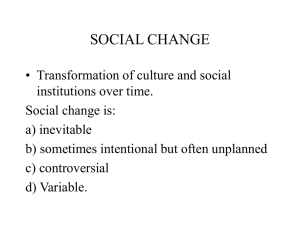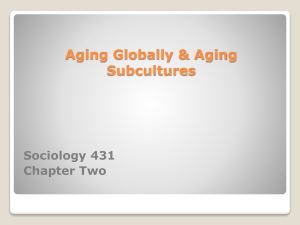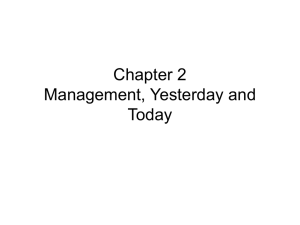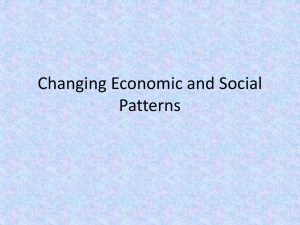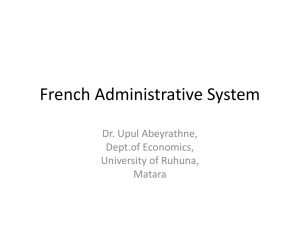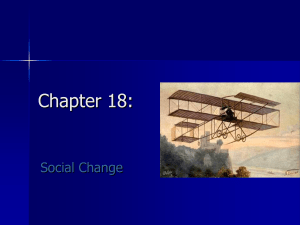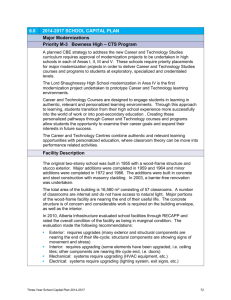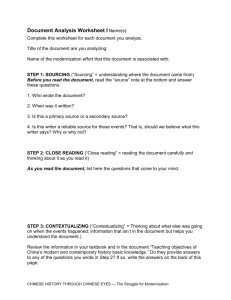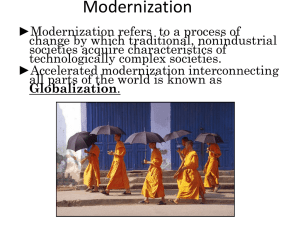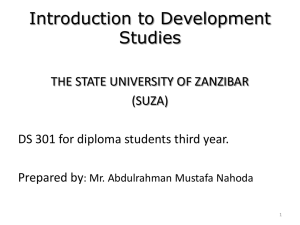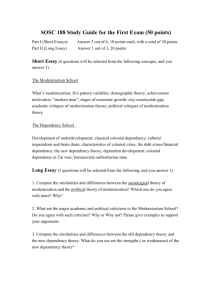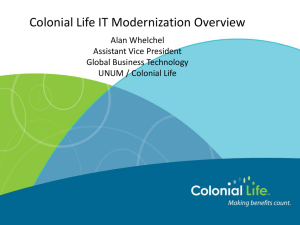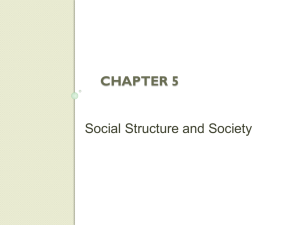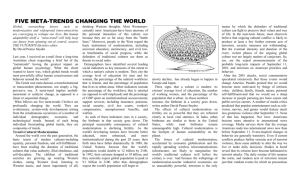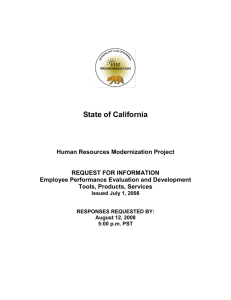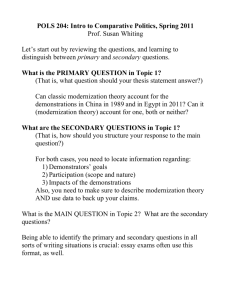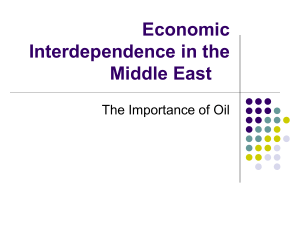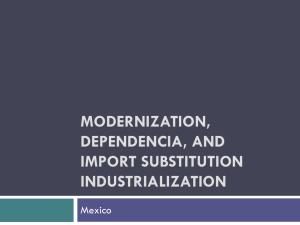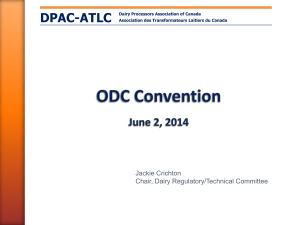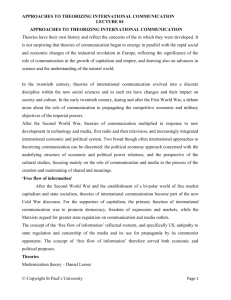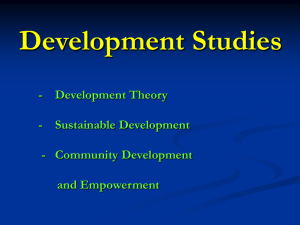Modernization Saramma Mathew
advertisement
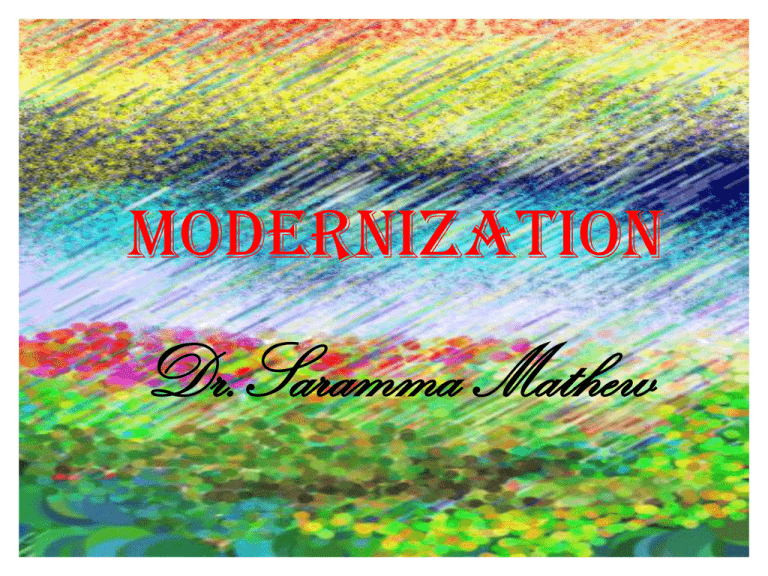
Modernization Dr.Saramma Mathew Modernization an evolutionary transition from a 'traditional' to a 'modern' society. Modernization • society is transformed from a rural and agrarian state to an industrialized, secular, urban society. • In a modernized society, an individual becomes the basic unit of society and this makes them more important than the family or community. • The importance of traditional religious beliefs declines, leading to the loss of distinctive cultural traits Modernization • societies have a standard evolutionary pattern, as described in the social evolutionism theories. • According to this each society would evolve inexorably from barbarism to ever greater levels of development and civilization. Talcot Parson Definition……. • Modernization, according to Lerner (1958) involves complementary changes in the • demographic, • economic, • political, • communication, and • cultural sectors of a society Definition……. • Heady (2001) simplifies the task by saying that for nationstates, modernization consists of • economic development, • political development, • and freedom from dependency upon other states. Characteristics of Modernization Empathy : • The capacity to see one self in others situations • Modern societies are more compassionate and accept the variations and situations which do not conform to usually accepted social values • for e.g. AIDS patients are no longer stigmatised or out cast from societies. This is not the case in closed or orthodox societies. Mobility: • Modern societies give opportunities for individual to climb the social and economical ladder. • An individual’s worth and success depends on his ability and merit rather than his birth. • Closed and orthodox societies on the other hand still cling on to hereditary values. • For eg. in our Indian context, we have adopted democracy as a political institution but elect leaders because of their parentage. High participation: • Citizens of a modern society have high awareness levels and they participate activity in the affairs of the state governance. • Social issues are openly debated and relevant solutions are provided. • For example people activity participate in exercising their franchise whenever corruption issues are brought out the public insists on proper justice Interest articulation: • Individual in a modern society do not allow themselves to be exploited there is an awareness in the society regarding the various social issues facing them. • There are people of various interests in a society but when there is a clash it solved through public debates. • For eg. Issues like corruption are discussed and debated. Interest aggregation: • Here individuals with community interest push forward this demands. • For e.g. a factory polluting the environment can be taken to task by concerned citizens of the area. Institutionalized political competitions: • People with different political ideologies interest groups can compete in an accepted and just manner. • People participate politically through elections and change opinion on matters of public business. • multiparty system is an example of this. Achievement motivation: • Individual in a modern society have high aspirations. • To achieve success they are realty to put in hard work and make sacrifices. • For example young people who may have been considered lazy in their villages transform into enterprising people when they come and work in cities. Rational ends means calculation: • Here individuals are not dependent on the super natural or fate for the happenings in life rather they analyse the situation to solve problems. • The ends and means are not decided by religious or social controls but on independent and rational thinking. • For eg.taking decisions regarding marriage, family size or career. New attitude to wealth, work, saving and risk taking : • individuals in a modern society take more risk invests in new business and are more innovative. • Faith in desirability and possibility of change. • for e.g. we see the orthodox individuals investing in gold or government securities while modern and enterprising people invest themselves in the share market. New attitude to wealth, work saving and risk taking : • Orthodox individuals avoid any kind change and views change as a threat or evil. • Modern individual believes that change is a permanent fact of life it is desirable and will bring about progress in the society. Only 2.77 percent of India‘s population pay income tax Social economic and political discipline: • Modern individuals beliefs in self discipline. Their code of conduct is based of social & moral values that bring a balance in the society. • They believe that every citizen is responsible for the social economic & political stability of the country. Capacity to put off immediate and short term needs: • for higher satisfactions in the longer run. • Here we see a modern individual who saves for the future • takes care of the environment as it will affect his future • puts off immediate luxuries for education and health of the family.. • The attributes from (viii) to (xii) are drawn from the writings of Ithiel Desola Wilbert Moore and Dube. • The last five attributes refer to individual attitudes which characterise a modern individual Process of modernization Awareness Process of modernization Trial Process of modernization Shaping Process of modernization Adoption Process of modernization Dissemination Process of modernization Diffusion
